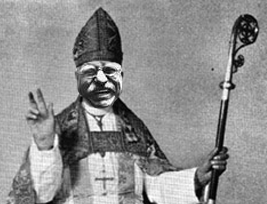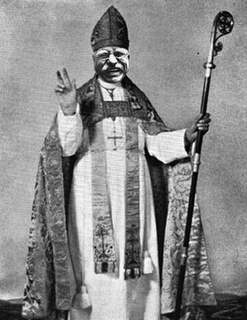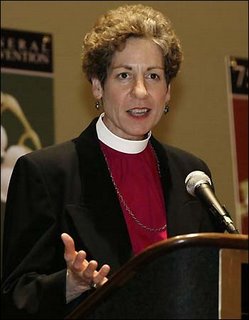Western Rite Orthodoxy: Our Plea
As the mainline churches continue to unravel and their faithful consider joining the Western Rite, I offer this guest editorial. Fr. Michael Trigg, Ph. D., wrote it as the conclusion to the pamphlet An Introduction to Western Rite Orthodoxy, which he edited. He dedicated this entry to the "great number of Western Christians who are identifying less with their denominational membership and more in terms of how their beliefs square with the traditional teachings of the Christian Faith." Again, his inspiring words and analysis are remarkably prescient for today:
Many traditional Christians now find themselves in denominations which are increasingly liberal in their doctrinal and moral theology and revisionist in their liturgical practices. Here, Christianity is often seen as a religion whose doctrines and practices are, to varying degrees, open to alteration depending on contemporary thought.
Believing, as many do, that the Christian Faith is a religion of objective and revealed truth which must remain unchanged, many of these traditional Christians are convinced that their conscience will be compromised by continuing membership in their respective denominations. Often feeling a sense of betrayal, these followers of Jesus Christ are increasingly seeking out others who believe as they do, in an expression of Christianity where there are basic doctrines which remain eternal and unchangeable.
A Church Rooted in Time
Americans have often been accused of having a very short and shallow sense of history. Sadly, many American Christians are no exception to this rule. The time has come for Christians to break out of this historical amnesia and rediscover the true roots of their spiritual heritage. If they do so, they will discover that Christianity is an historically based Faith revealed by the incarnate Son of God, who lived and died in time, and founded a Church which was to be His extension throughout human history. They will find that during the first thousand years of Christian history, this Church existed undivided, dating back to the Acts of the Apostles, and spanning all of the then-known world of both the East and the West.
This discovery alone might well be the start of a pilgrimage of the spirit and the intellect leading many Christians not to Rome or Canterbury, not to Geneva or Augsburg, but to Jerusalem and to the Church which found its origins there on the day of Pentecost, the Orthodox Church. That same Church continues today, faithful to the teachings of Christ and His Apostles, true to the early Councils of the Church and maintaining traditional doctrine and worship, unaffected by the revisions and reinterpretations of any age—including our own.
Reuniting East and West
As you have been reading in this booklet, a very significant development has occurred relatively recently within the Orthodox Church, as she has recalled the heritage of the Orthodox West before its great schism from the East in the eleventh century. That first millennium of Western Orthodoxy, with its saints and martyrs, its liturgy and theology, is once again entering Orthodox Christian consciousness.
From the first, attempts to restore Western culture and liturgy to Orthodoxy have been seen to have great potential for calling Western Christians back to the Church of their ancestors, healing the thousand-year-old break which tore the Christian West from its ancient roots in the Orthodox East.Simply stated, this reunion has become the mission of Western Rite Orthodoxy. Its calling is to provide a vehicle by which those who seek to adopt the ancient Faith of the Apostles can do so within their own cultural and liturgical milieu. As such it should be seen not so much as an innovation as a restoration of Western Christians to their rightful place within Orthodox Christianity.
This being said, it is important to point out that Western Orthodoxy must never be seen simply as a device by which traditional Christians, disenchanted with their former denomination’s liberal theological and moral leanings, can find a safe harbor within the Orthodox Church while retaining favorite sectarian doctrinal positions. While the recognition of theological errors in one’s own denomination may be the beginning of a traditional Christian’s pilgrimage to Orthodoxy, the journey should and must end with the embracing of the fullness of the Faith.
Today, in America, the Orthodox Church is represented by various jurisdictions. In recent years, one of those jurisdictions, the Antiochian Orthodox Christian Archdiocese, has become the new spiritual home for many thousands of traditional Christians. This Archdiocese is under the Patriarchate of Antioch, one of the four great and ancient Patriarchal Churches of worldwide Orthodoxy.
Remembering that historical Orthodoxy has had many liturgical expressions in the past, and that most Western Christians are unfamiliar with Eastern forms of worship, the Archdiocese has authorized the use of Western Rite Liturgy. For many people who are seeking to return to the historical Church and yet wish to retain a Western manner of worship, this authorization has great appeal. Consequently, in various American cities, there are today a number of Orthodox congregations under the Archdiocese whose approved liturgy is that of the Western Rite.
A Time for Healing
For those who complete this journey to Orthodoxy, often there has been a realization that Orthodox Christianity has been something in which they have always believed, albeit outside the Church itself. Inasmuch as elements of Orthodoxy have remained to varying degrees within many Christian denominations, those who find their way home to the Faith are often pleasantly surprised to find there those beliefs which they have always held to be their own. More than one Western non-Orthodox thinker has been an excellent and articulate spokesman for the Orthodox Faith without being fully aware of it.
Our Lord prayed that His Church might be one. He promised that the gates of Hell would not prevail against it. Through the Holy Spirit, it was founded on that first Pentecost and we read about its early history in the Acts of the Apostles. This is the Church of Saint Peter and Saint Paul, and it was in Antioch that the disciples of Jesus were first called Christians.
Whenever Christians make the decision to become members of the ancient Church they participate actively in the healing of one small wound in the Body of Christ. By returning to the Church of the Apostles, they overcome a thousand years of division and confusion, error and ignorance. As people of a Western heritage, they rejoin the Church and Faith of their Fathers, the Orthodox Faith of Saint Patrick, Saint Benedict, Saint Augustine of Canterbury, and of so many other heroes and martyrs of the pre-schismatic Orthodox West.
A Journey Worth the Effort
While traditional Christians seeking to become Orthodox may have to make considerable sacrifices to do so, it is important to remember that the Orthodox Church has been called the Church of the Martyrs because its history abounds with the accounts of men and women who have been willing to make incredible sacrifices for the Truth of Christ.
Two parables in particular from Holy Scripture come to mind. One is that of the Buried Treasure. Jesus said, The kingdom of heaven is like treasure hidden in a field, which a man found and hid; and for joy over it he goes and sells all that he has and buys that field (Matthew 13:44). The other parable is that of the Pearl of Great Price. Our Lord said, The kingdom of heaven is like a merchant seeking beautiful pearls, who, when he had found one pearl of great price, went and sold all that he had and bought it (Matthew 13:45, 46).
The first man happened on to a great treasure quite by accident, while the latter man actively sought it. In both cases, however, their intelligent perception and proper sense of priorities caused them to recognize something of great value, and they disposed of whatever else they had to acquire the ultimate prize. This buried treasure, this pearl of great price, is Orthodox Christianity.
Our Plea
This booklet was specifically written for those who are seeking a truly traditional and scripturally based Christianity and wish to be a part of the restoration of Western people to their rightful place as members of the ancient Church. We invite you to consider the saving life offered by God through His Holy Orthodox Church. Twentieth-century Christianity, to be fully valid, must have unbroken links with first-century Christianity. Only in Orthodoxy can be found the apostolic continuity and the consistency of truth which has preserved this linkage.
We therefore encourage you to join countless others as they, too, begin their pilgrimage into God’s Kingdom by becoming one with His Holy Church. Come, join us in this new Reformation—by returning to the historic teachings of the Bible, the Church, and Holy Tradition. No sacrifice is too great to become a part of the Church which has, alone, preserved the fullness of that Faith delivered by Christ to His Apostles.
May God inspire you and encourage you as you begin your journey!
Labels: WR History




